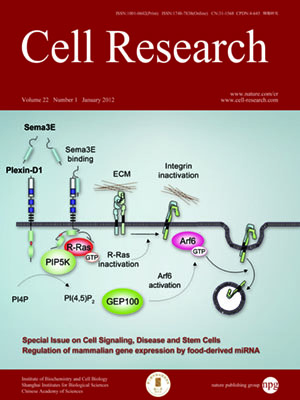
Volume 22, No 1, Jan 2012
ISSN: 1001-0602
EISSN: 1748-7838 2018
impact factor 17.848*
(Clarivate Analytics, 2019)
Volume 22 Issue 1, January 2012: 219-236
ORIGINAL ARTICLES
Ascorbic acid enhances the cardiac differentiation of induced pluripotent stem cells through promoting the proliferation of cardiac progenitor cells
Nan Cao1, Zumei Liu1, Zhongyan Chen1, Jia Wang1, Taotao Chen2, Xiaoyang Zhao3, Yu Ma1, Lianju Qin1, Jiuhong Kang2, Bin Wei2, Liu Wang3<
1Key Laboratory of Stem Cell Biology, Institute of Health Sciences, Shanghai Institutes for Biological Sciences (SIBS), Chinese Academy of Sciences (CAS) & Shanghai Jiao Tong University School of Medicine (SJTUSM), Shanghai 200025, China
2Laboratory of Molecular Cell Biology, Institute of Biochemistry and Cell Biology, SIBS, CAS, Shanghai 200031, China
3State Key Laboratory of Reproductive Biology, Institute of Zoology, CAS, Beijing 100101, China
4Shanghai Stem Cell Institute, SJTUSM, Shanghai 200025, China
Correspondence: Huang-Tian Yang,(htyang@sibs.ac.cn)
Generation of induced pluripotent stem cells (iPSCs) has opened new avenues for the investigation of heart diseases, drug screening and potential autologous cardiac regeneration. However, their application is hampered by inefficient cardiac differentiation, high interline variability, and poor maturation of iPSC-derived cardiomyocytes (iPS-CMs). To identify efficient inducers for cardiac differentiation and maturation of iPSCs and elucidate the mechanisms, we systematically screened sixteen cardiomyocyte inducers on various murine (m) iPSCs and found that only ascorbic acid (AA) consistently and robustly enhanced the cardiac differentiation of eleven lines including eight without spontaneous cardiogenic potential. We then optimized the treatment conditions and demonstrated that differentiation day 2-6, a period for the specification of cardiac progenitor cells (CPCs), was a critical time for AA to take effect. This was further confirmed by the fact that AA increased the expression of cardiovascular but not mesodermal markers. Noteworthily, AA treatment led to approximately 7.3-fold (miPSCs) and 30.2-fold (human iPSCs) augment in the yield of iPS-CMs. Such effect was attributed to a specific increase in the proliferation of CPCs via the MEK-ERK1/2 pathway by promoting collagen synthesis. In addition, AA-induced cardiomyocytes showed better sarcomeric organization and enhanced responses of action potentials and calcium transients to β-adrenergic and muscarinic stimulations. These findings demonstrate that AA is a suitable cardiomyocyte inducer for iPSCs to improve cardiac differentiation and maturation simply, universally, and efficiently. These findings also highlight the importance of stimulating CPC proliferation by manipulating extracellular microenvironment in guiding cardiac differentiation of the pluripotent stem cells.
Cell Research (2012) 22:219-236. doi:10.1038/cr.2011.195; published online 6 December 2011
FULL TEXT | PDF
Browse 12546


